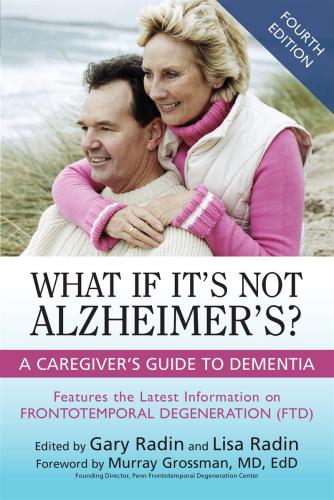What If It's Not Alzheimers?: A Caregiver's Guide To...
| Item Information | |
|---|---|
| Item#: | 9781633888722 |
| Edition | 04 |
| Author | Radin & Radin |
| On Hand | 0 |
Although the public most often associates dementia with Alzheimer’s disease, the medical profession continues to advance distinctions of various types of “other” dementias. What If It’s Not Alzheimer’s? is the first and remains the only comprehensive guide dealing with frontotemporal degeneration (FTD), the most common form of dementia for people under 60 years of age. The contributors are either specialists in their fields or have exceptional hands-on experience with FTD sufferers. Beginning with a focus on the medical facts, the first part defines and explores FTD as an illness distinct from Alzheimer's disease. Also considered are clinical and medical care issues and practices, as well as such topics as finding a medical team, palliative approaches to managing care and rehabilitation interventions. The next section on managing care examines the daily care routine including exercise, socialization, adapting the home environment, and behavioral issues along with end-of-life concerns. In the following section on caregiver resources, the contributors identify professional and government assistance programs along with private and community resources and legal options. The final section focuses on the caregiver, in particular the need for respite, holistic health practices and the challenge of managing emotions. This new, completely revised edition continues to follow worldwide collaboration in research and provides the most current medical information available including understanding of the different classifications of FTD, and more clarity regarding the role of genetics. Additionally, essays written by people living with the disease provide moving, first-hand experiences. The wealth of information offered in these pages will help both healthcare professionals and caregivers of someone suffering from frontotemporal degeneration.
Review Quotes
""What If It's Not Alzheimer's? is a must-read for anyone dealing with a diagnosis of dementia, especially FTD. The practical information, the resources, and the depth of understanding reflected in this book provide a comprehensive reference to guide and accompany a person throughout the journey.” —Susan L.-J. Dickinson, MS, CGC, executive director of the Association for Frontotemporal Degeneration “I am certain that no other lay writers have been more dedicated to updating the vital information to help caregivers navigate the emotionally trying, ever-evolving landscape of early-onset, non-Alzheimer's dementia. These caregivers remain underserved, highlighting the importance of this book and of finding each other.”—Dr. Tiffany Chow, behavioral neurologist, author of The Memory Clinic Praise for the first edition:“[A]n updated handbook packed from cover to cover with tips and information for caregivers and sufferers alike." -- Bookwatch “[D]eals with a topic about which little has been written. ...an excellent resource....makes an important contribution to the family caregiving literature because of the biomedical and professional insight it offers into an important but rarely discussed type of dementia.”-- Canadian Journal on Aging
"A diagnosis of a degenerative brain disease is devastating to individuals and their families and can be scary, overwhelming and burdening. This book packs all of the critical information, ideas and resources into one place saving caregivers valuable time and energy. It is comprehensive, insightful and reliable due to the collective wealth of knowledge from its contributors. It can be an essential guide for everyone dealing with FTD, including health professionals." - Dr. Irene Litvan, Neurologist and Professor of Neurosciences, UC San Diego
What If It’s Not Alzheimer’s? has been a resource that I recommend to the families of my patients with frontotemporal degenerative disorders since the book first became available in 2003. Now, with this fourth edition that has been extensively updated, the book has only become more informative, more comprehensive and more accessible. Covering diverse but critical information about FTD, whether it is about managing caregiver stress, explaining genetic risks or laying out a guess about what the future management challenges will be, this book is an invaluable aid to families on the journey with FTD." - David S. Knopman, MD, Consultant in Neurology, Mayo Clinic

